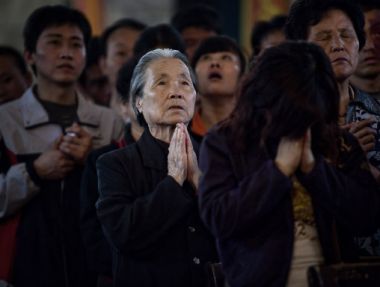Son of Chinese State Church founder sues government to save father's reputation

The son of the founder of China's state-sanctioned Church is suing the government in an attempt to restore honour to his father's name.
Wu Zongsu believes Chinese officials have hidden evidence showing that his father's original purposes have been twisted to further the government's secular agenda.
YT Wu, full name Wu Yaozong, is credited with founding the state-sanctioned Three-Self Patriotic Movement (TSPM) – the only Protestant Church to be officially recognised by the Communist government.
After meeting privately with China's premier Zhou Enlai several times before the CCP took power in 1949, and later with Chairman Mao Zedong, YT Wu led China in the establishment of a national Church that would be faithful to the Communist government.
The TSPM – which promoted self-governance, self-support and self-propagation – hoped to harness the Christian population, which stood at around one million in 1949, while ensuring that there would be no conflict between faith and the party line.
However, the Movement has been fraught with contention – considered by many to be a tool used by the atheistic government to control, and ultimately limit, the growth of Christianity.
YT Wu, therefore, has a mixed reputation among the Chinese Christian community. According to William Wan of the Washington Post, he is "vilified" among the underground church, who believe Wu "delivered China's Christian community into the hands of the Communist government and abetted the persecution of hundreds of thousands of Christians."
Now, more than six decades since the TSPM was founded, Wu Zongsu, is hoping to restore his father's legacy.
Wu has filed a lawsuit against the Chinese government in an attempt to recover 40 of his father's diaries which he lent to authorities following his father's death.
The government has failed to return them, claiming they are now "state property". Wu believes they contain vital information which will show that the Three-Self Church is a distortion of his father's original vision.
"Some call my father a prophet; others say a betrayer. But the truth is he was just a man, a very complicated one," he told the Washington Post.
Wu has been critical of some of his father's moves, but insists that his motives were good.
"My father saw Communism and Christianity as two sides of the same truth - in pursuit of the same goal, a better society," he said.
Wu even published a 60-page paper entitled 'Fallen Flower, Ruthless Waters' several years ago, which details his father's life and work. It has been described as "surprisingly unsentimental and unsparing in parts," though it is ultimately favourable towards his father, who Wu labels a "tragic figure".
Despite now being extolled by the Chinese government, YT Wu was actually sentenced to hard labour during the Cultural Revolution, a time when all religious activity was outlawed by Mao.
He died a year before the Three-Self movement was re-established.
"There was an evil backstage manipulator behind everything my father did, and this manipulator was the Chinese Communist Party," Wu explained in an interview with China Aid earlier this year.
He is now hoping to publish a collection of his father's speeches and writings, as well as the diaries if he wins the lawsuit. He believes it will prove that there is a conflict between his father's beliefs and the TSPM as it now stands.
"Christianity and Communism are like fire and water," he told Wan.
"Christianity emphasizes love. Communism emphasizes the life and death struggle of classes."











